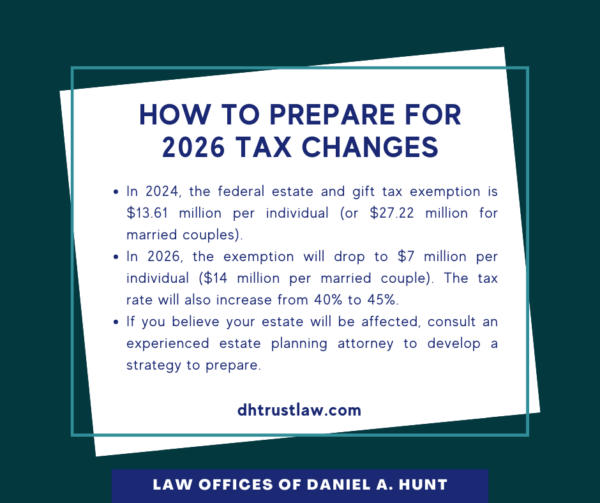How to Prepare for 2026 Tax Changes

Tax changes in 2026 could impact individuals and couples with larger-sized estates, thanks to the sunset of the 2017 Tax Cuts and Jobs Act. If you have a larger estate, it’s critical that you understand and prepare for the upcoming changes in tax law. In this blog post, we’ll share how to prepare for 2026 tax changes.
What is the Tax Cuts and Jobs Act?
The Tax Cuts and Jobs Act (TCJA) was a piece of tax legislation passed in 2017. Before the TCJA, the lifetime estate and gift tax exemption was $5.6 million.
TCJA nearly doubled the exemption to $11.18 million for individuals, indexed for inflation after 2018. As of January 1, 2024, the indexed exemption is a very high $13.61 million per individual ($27.22 million for married couples). This means that only the uber-wealthy needed to worry about paying estate taxes.
But change is coming! Unless Congress takes further action, the TCJA will sunset on Dec. 31, 2025.
Anticipated 2026 Tax Changes
In 2026, the tax exemption will drop to a much lower $7 million per individual ($14 million per married couple). In addition, the current 40% maximum gift and estate tax rate will increase to 45% (the highest estate tax rate since 2009).
This means that a higher volume of estates will potentially be subject to estate taxes, and will be taxed at a higher rate. If you’re an individual with an estate worth anywhere close to $7 million (or $14 for a married couple), you should carefully consider how to minimize the impact of these changes on your estate.
How to Prepare for Tax Changes
If you have a larger estate, here are three potential options to prepare:
- Use Your Exclusion: One possible solution could be to leverage your annual gift tax exclusion. For 2024, that is $18,000 per individual or $36,000 per married couple. You could use one individual’s exclusion or for married couples, both.
- Leave It To Charity: Leaving your estate to a 501(c)(3) organization reduces your taxable estate while leaving a legacy to the cause of your choice, whether it’s a nonprofit, an educational institution, or a church.
- Create an Irrevocable Trust: You may transfer a portion of your lifetime estate and gift tax exemption into an irrevocable trust (like an IDGT Intentionally Defective Grantor Trust or a SLAT- Spousal Lifetime Access Trust) for the benefit of your intended heirs.
If you’re concerned that the 2026 law changes will impact your estate, seek counsel from an experienced estate planning attorney. They can help you review all of the available options and find the solution that best meets your personal goals.
Law Offices of Daniel A. Hunt
The Law Offices of Daniel A. Hunt is a California law firm specializing in Estate Planning; Trust Administration & Litigation; Probate; and Conservatorships. We've helped over 10,000 clients find peace of mind. We serve clients throughout the greater Sacramento region and the state of California.




